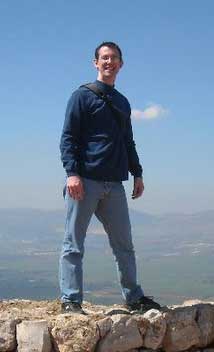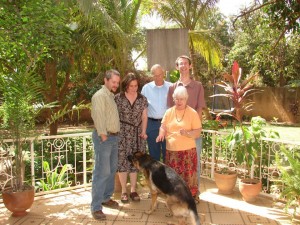
Me!
Hello. I wrote this page over a period of several weeks so that you can get to know me better.
I was born at a very young age in Africa to parents who were missionaries. My brother and I came along late in life for my parents; doctors were not certain if they could have children. Many prayers were made, but no babies materialized. So, they continued with what they felt God wanted them to do. They prepared themselves and moved to West Africa to share God’s love with those who had never heard. They had lived in Africa for several years when my Mom became pregnant with my brother who was born in Oklahoma.
Well… I had originally decided to open with a lighthearted critique of my parents’ decision to travel back to the United States for my brother’s birth but not for mine. I had always thought of this decision as a bit of an insult and would freely trot it out in an effort to garner sympathy. I assumed that my parents were satisfied with one child and were not greatly concerned over the survival of a second. However, at dinner one evening I discovered that my version of the story had never matched reality (insert crooked smile). Apparently, my brother was born during my parents’ scheduled year of itineration in the States, and going or staying for his birth was never a decision to be made. Who knew?

My Family – Ignore the dog.
As for me, I just happened to be born overseas. In any case, I do get to say that I was born in Africa, so that’s cool. On October 31, 1981, the earth became a better place.
I was born in Dakar, Senegal though my family actually lived in a large village called Tambacounda. When I was about four, my family spent a year in America and then moved to Lome, Togo. Most of my childhood African memories come from the rather modern city of Lome. In Africa, we didn’t own a television, a dishwasher, or a laundry machine. We did, however, own a refridgerator though it would occasionally shock the barefooted child who touched it.
As a kid, I remember having several African friends, but I strangely don’t remember ever really carrying on an actual conversation with any of them. Much of western Africa uses French as their official language of trade. However, because most African countries are also home to multiple tribal languages, many of my African friends struggled with French as much as I did. Children possess a unique propensity for non-verbal communication, and it’s sad that we seem to lose this ability as we become adults. I remember a strange sense of companionship with them though we hardly ever spoke to each other. As children, stupid things like skin color, language, and economic status just don’t seem to carry much weight. Building friendships, constructing sand castles, and procuring old bicycle wheels are much more urgent concerns.
I was about 8 when we moved permenently to the States. As a kid raised in villages and towns in Africa, the modern world fascinated me. My brother and I marveled every time we drove underneath an overpass, and we especially enjoyed seeing overpasses with multiple layers. There are few multi-layered overpasses in Oklahoma, so traveling to Texas was a particular treat. I thought of Texas as the land of many roads and endlessly tall buildings.
When we first arrived in Oklahoma, I remember going with my mother and brother to visit the middle school that he would be attending. We were standing in the cafeteria with a teacher, and I turned to my mother to inform her that I was thirsty. The teacher smiled sweetly and pointed to a metal box attached to the wall. I wasn’t sure what she was implying. “It’s a water fountain,” my mother explained. I found the whole idea of a cupless spout of public drinking water to be rather strange. A few days later, we also visited the elementary school that I would attend for the next three years.
I look back upon junior high with a general sense of pleasantness, but I can’t actually recall any specifically good memories. Strange. In fact, I can, however, think of several specifically bad memories. In 3rd, 4th, and 5th grade, being the white kid who acts like a foreigner is unique and even endearing. However, middle school is all about being cool and fitting in- neither of which could I do very well. I stumbled through 6th grade but decided in 7th grade that bullies weren’t worth my time or patience. So… I started punching them… all of them. My plan of attack had varying levels of success.
I remember one particular incident for which both I and my bully victim were sent to the vice principal’s office. ‘Vice’ is a good adjective, something that squeezes and applies pressure. That day in English class, my toleration for abuse had been breached, and I had bludgeoned my enemy’s face with the end of a hard-back book. It seemed like a good idea at the time. In high school you realize that teachers are actually just humans, but in junior high the fear of the principal remains. Mrs. White was infamous for her stern look and foul disposition. No one wanted to talk to Mrs. White much less be on the wrong side of her interrogation. I remember sitting in her office for several minutes waiting for her arrival. She must have made us wait on purpose; waiting was very intimidating. Just shoot me! She came in, sat down, and began talking. I couldn’t believe the words I was hearing. She said that I had every right to do what I did. I was shocked. I knew that I should not have retaliated and had prepared myself for punishment. Perhaps Mrs. White thought I had been punished enough already. I learned a lesson about kindness and forgiveness that day. I also learned that principals were nice. Who would have thought?
High School came and went. I didn’t like it much. I suppose I’m glad I went.
I loved college life. I look back on it now, and it kind of seems juvenile, but I guess that’s what college is supposed to be like. At the time, I did truly love it. I enjoyed walking down the hall at midnight and chatting with various buddies. A friend told me one evening that he could set his clock by my daily visits.
In Bible college I developed a great love and respect for the Bible and a realization that most modern Christians abuse it in order to conform it to their own ideas. When I was a freshman, I remember leaving class one day with mixed feelings of great emotion. We had been studying basic principles to Bible study, and I was learning techniques and concepts that were opening to me a new world of Biblical reality. I became angry. I had been a Christian my whole life, and no one had ever set me down to instruct me on the best way to read and interpret the Bible. I soon realized that most Christians don’t actually follow any rules of interpretation. No one taught me to be a good Bible-reader because no one had taught them.
I developed another burning passion in Bible College. For one of my classes, I read a book about the dying art of personal discipleship. In this world of technology and mega-churches, the practice of hands-on discipleship has been discarded as antiquated. Jesus spent the vast majority of his ministry investing in the lives of 12 men and a few women. Most Christians live their whole lives and never tell a single person about Jesus, let alone make a disciple. I have discovered that much time and effort is required to build a disciple. The future of Christianity depends upon our current involvement in discipleship.
Niger is a country full of people who have never heard an adequate representation of the love of Christ. My purpose in Niger is to develop new and young believers through small-group discipleship.
Thanks for reading.

Recent Comments